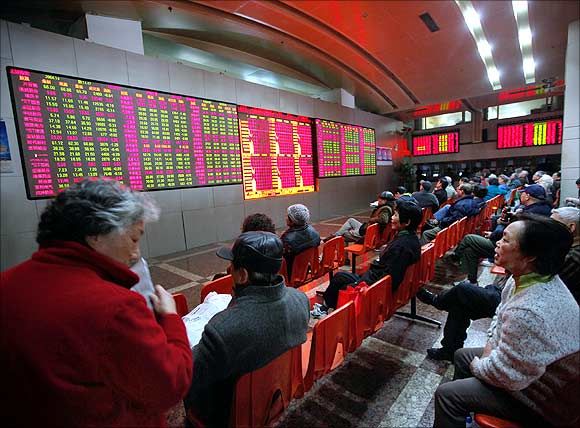 China may cut its GDP growth target to 6.5 per cent from the present seven per cent in its next five-year plan in view of the continued slowdown of the world's second largest economy.
China may cut its GDP growth target to 6.5 per cent from the present seven per cent in its next five-year plan in view of the continued slowdown of the world's second largest economy.
China may cut its GDP growth target to 6.5 per cent in the next five years, a further decrease from this year's goal of seven per cent, Economic Information, a newspaper affiliated to state-run Xinhua news agency cited experts as saying.
Recent International Monetary Fund forecast said China's growth is expected to slow down from 7.3 per cent in 2014 to 6.8 per cent this year and 6.3 per cent in 2016 as the country struggles with its shift from export oriented economy to the one driven by consumption.
The projection of 6.5 per cent as a new target follows the announcement that a meeting of the Plenum, a top policy body of the ruling Communist Party of China headed by President Xi Jinping will meet in Beijing from October 26 to 29 to map out the 13th five-year plan (2016-2020).
The new plans takes into the consideration of the current slowdown and lay out institutional Party reform plans to guarantee a better and effective national leadership.
The decision to convene the plenary was taken by politburo meeting of the CPC headed by Xi which has also approved two revised rules on clean governance and punishments for breaking Party rules, a report said.
China has drawn five-year plans since 1953 to map strategies for overall economic and social development, setting growth targets and defining development policies.
Besides efforts to address to halt the slowdown and carry forward the urbanisation process, the new plan's thrust was expected to lift 70.17 million people who are still below poverty in China by 2020.
It meant that a million people have to be lifted to above poverty line every month specially when the world's second largest economy is on down word trajectory.
In the past 15 years, China has lifted more than 600 million people out of poverty, accounting for about 70 per cent of those brought out of poverty worldwide, Hong Tianyun, deputy director of the State Council Leading Group Office of
Poverty Alleviation and Development of China said.
Despite this, China still had 70.17 million people in the countryside living below the country's poverty line of 2,300 yuan ($376) in annual income at the end of last year.
"As uncertainty looms over the global economy, the world will set their eyes on China's new five-year plan where they seek opportunities and direction," Cai Zhiqiang, a Party School of the CPC Central Committee professor told state-run Global Times.
The 13th five-year plan will work to promote people's well-being, strengthen economic construction and rule of law in the market economy, while further opening up to the outside world in all aspects, the Political Bureau said at a meeting in July.
"The next five years from 2016 will be epochal as it concerns strategic layout to accomplish its goals before the Party celebrates the 100th anniversary of its founding," Zhang Xixian, another professor with the Party School said.
The CPC was founded in 1921.
In 2012, the CPC identified two goals, pledging to double the nation's GDP and per capita income by 2020 from that of 2010 and vowing that by 2050, China would become a modern socialist country that is rich, strong, democratic, culturally advanced and harmonious.
Zhang said that the main task will be promoting urbanisation throughout the nation, and villages will become township-level cities.
"The most challenging task is still poverty relief, as tens of millions of our people still live below the poverty line.
“It is especially difficult to offer aid precisely to those in need," Zhang said.
Apart from a detailed policy-making process for a better-off society, analysts said that the five-year plan will also include a modern system to combat corruption and guarantee the Party has an advanced and effective leadership to handle the problem under specific rules and regulations.
Cai said that the Plenum may also issue announcements detailing punishments for some corrupt officials.
The three year long anti-corruption campaign initiated by Chinese President, Xi after he took over power punished 80 top officials of the CPC known as ‘Tigers’ along with hundred of ‘flies’ low ranked officials.
Over 40 top ranking military officials including two Vice Chairmen of the Central Military Commission, the highest authority of the Chinese military forces were investigated for widespread corruption including allegations of selling top posts in the military for money.









 © 2025
© 2025